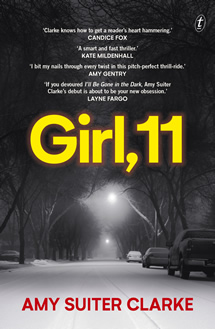Reviewed by Robert Goodman.
By Amy Suiter Clarke, Text.
 The protagonist in Amy Suiter Clarke’s debut thriller Girl, 11 is a true crime podcaster. Fictional true crime podcasters are coming out of the woodwork in crime fiction. Charlie Donlea has a couple of books featuring podcasters (eg Don’t Believe It), Australian author Benjamin Stevenson features a cold case podcaster in his Jack Quick series (starting with Greenlight), as does Megan Goldin in her latest book The Night Swim. And there is no reason why not. These characters have become the modern equivalent of the armchair detective – they don’t need any particular qualifications or experience, are self-appointed to investigate cold cases and use the power of social media to support them. Here’s a recent article in Crime Reads for those interested in this corner of the genre.
The protagonist in Amy Suiter Clarke’s debut thriller Girl, 11 is a true crime podcaster. Fictional true crime podcasters are coming out of the woodwork in crime fiction. Charlie Donlea has a couple of books featuring podcasters (eg Don’t Believe It), Australian author Benjamin Stevenson features a cold case podcaster in his Jack Quick series (starting with Greenlight), as does Megan Goldin in her latest book The Night Swim. And there is no reason why not. These characters have become the modern equivalent of the armchair detective – they don’t need any particular qualifications or experience, are self-appointed to investigate cold cases and use the power of social media to support them. Here’s a recent article in Crime Reads for those interested in this corner of the genre.
Girl, 11 opens with the most recent series of Elle Castillo’s true crime podcast focussing on a twenty year old cold case involving a serial killer known as The Countdown Killer (TCK). TCK, who may well be dead, was given that name due to a seeming obsession with numbers but also because each girl he kidnapped was a year younger than the last. The killings stopped when an eleven year old called Nora escaped and the cabin in which she was being kept burnt down leaving two other bodies, one of which was believed to be TCK. Twenty years on and Elle, a former child protection officer, still believes that TCK is out there, although no one else believes he is still alive. Her podcast is an attempt to shine a light on his activities. When the book opens, Elle is following up on a lead from a man called Leo who contacted her after listening to her podcast, but before she can get to the him he is murdered. And then, when an eleven year old girl is abducted it feels to Elle as if all of her fears have been realised and TCK is back. Only no one believes her.
Girl, 11 has everything that a good thriller needs. An obsessive investigator who no one believes, kids in jeopardy (complete with ticking clock because TCK always killed after 7 days), a cast of interesting side characters, some big twists and reveals (at least one of which is predictable almost from the first page), and a sad, creepy backstory for the villain. But also for this reason it feels a little over constructed. While Clarke uses these tropes to keep the pages turning the structure of the narrative is fairly predictable and the destination is never really in doubt.
Clarke does use her set up of a true crime podcaster looking at cold cases, to explore social issues around this form of media. Elle generates plenty of negative attention from her podcast and has to deal with the more abusive end of the social media spectrum. There are questions about whether it is right to put victims through the trauma of reliving and recounting events and whether the promotion of a criminal and their activities might spur someone to become a copycat (even though the details were all available for those who wanted to look, the argument here is that the true crime podcast has potentially brought the story to life for a copycat).
Girl, 11 is nonetheless a well written debut which uses podcast transcripts to deploy the more common tropes effectively. Clarke sets the action in a believably wintery Minnesota and Elle is a flawed character who readers will enjoy spending time with even as she unravels.
This and over 600 more reviews can be found on Pile by The Bed.











